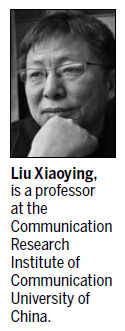'China threat' theory is absurd
As the sleeping dragon awoke toward the end of the last century, the West felt uneasy. And when it took off on the road to rapid economic development, the West's unease began turning into fear, giving rise to the "China threat" theory which is bandied about so rampantly across the world today.
Is there any justification behind this theory? China Daily put this question to Liu Xiaoying, a professor at the Communication Research Institute of Communication University of China.

In short, Liu's answer is "no". But he prefers to delve deep into the reasons behind, what he says is, the unjustified fear gripping the West.
Some people try to attribute the country's economic rise to "China's development model", Liu says, building an insurmountable barrier between the East and West, between antiquity and modernity.
"China is just regaining its long lost right to have its say in world affairs. Harmonious coexistence of countries entails diverse views, not a hegemonic monopoly which presumptuously claims to speak for all the countries." The fact is that the Chinese leadership has too many domestic problems to solve and doesn't have the time to pose a threat to other countries or regions.
Historically, the rise of a country has created controversies and raised the concern of its neighbors and, above all, the existing powers. It's natural for the West to nurse such views as the "China threat" theory. But it shouldn't deny China from having its say.
Chinese people can have their say by solving their problems, building the country's image and ridding the rest of the world of its misunderstanding and prejudice against China through their actions.
Among those actions, transparency takes the top spot. The West has long based its "China threat" theory on the blown-up image of the country's economic success presented by the Chinese media. The Chinese media may be over-enthusiastic but since ancient times, Chinese politicians have considered economic growth as the best justification for being in power.
The Chinese government's goal is to build a harmonious society not only in the country, but also across the world. A harmonious society, however, is by no means a system dominated by one single thought, rather it is more of a system based on diverse thoughts, the best of which are combined to bring the maximum benefit to the country and its people. It is to be understood that covering our drawbacks will intensify the tensions in the social system. This could create an obscure image of China, which would give the West enough room to indulge in rumor-mongering.
Go to Forum >>0 Comments
 Add your comments...
Add your comments...
- User Name Required
- Your Comment
- Racist, abusive and off-topic comments may be removed by the moderator.
 0
0 






